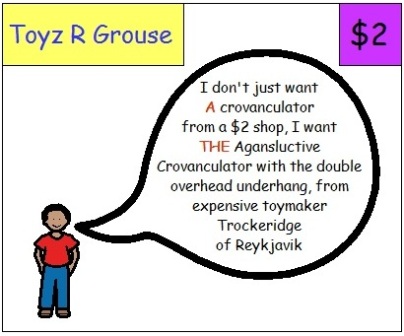a and the
1 Replies
The words "a" and "the" are two of our language's most frequently-used words. They make the top half-dozen on everyone's "most frequent words" list, and the word "the" is generally number 1.
These two little words thus always show up on lists of whole words that five-year-olds are unfortunately taught to memorise holus-bolus. If they're not handled well, they can really, really confuse children about vowel spellings and sounds.
Think about how you say the words "a" and "the". Unlike most one-syllable words, they have two pronunciations. Read these sentences aloud:
| Unstressed (usual) pronunciation | Stressed (emphatic) pronunciation |
| I saw a Martian on the way to the shop. | I didn't say I saw a Martian, I said I saw the Martian you were talking to yesterday. |
| Would you please pass me the icecream? | I don't want just any old icecream, I want the icecream we discussed earlier. |
| Can you please pass me a banana? | When I said "please pass a banana", I wasn't asking for the whole bunch. |
Most of the time we say these little words in an unstressed way, because they're grammatical forms, not content words that convey key meanings in the sentence. It's only when we use them in an emphatic way in ordinary conversations that we use their stressed pronunciation ("a" rhymes with "day", "the" rhymes with "be").
"A" and "the" have tricky spellings
The "long vowel" sound "ay" is not usually spelt with a single letter a in one-syllable words.
It's usually spelt a…e as in "make", ai as in "rain" or ay as in "day" (a full list of all this sound's spellings is here).
A single letter A is only a typical spelling for the sound "ay" in multi-syllable words, as in "apron", "basin", "paper" and "table".
The word "the" pronounced to rhyme with "tree" does follow one of the typical spelling patterns for one-syllable words, like "be", "he", "she", "me" and "we", and it's in heaps of longer words too (see a list here). So it's less confusing.
Learners mix up "a" and "u"
Most of the struggling literacy-learners I've worked with over the years have had to unlearn the habit of saying "uh" when sounding out the letter a. This means they've typically read the word "dab" as "dub", "tag" as "tug" and "sack" as "suck".
I think at least part of their problem has been that they've learnt the word "a" pronounced "uh" before they've consolidated their understanding of the "a" in "cat".
Fortunately, "be", "he", "she", "me" and "we" are all usually on lists of sight words (Wikipedia puts them all in the most common 50 words), so learners don't usually generalise from the word "the" to read these as "buh", "huh", "shuh", "muh" and "wuh".
Rhyme the word "a" with "say", and "the" with "she"
For the sake of accuracy, you can tell literacy-learners that there are two ways to say the little words "a" and "the":
1. The stressed way, when they are used to express an important meaning in the sentence (as in "I want THE expensive branded toy, not just A cheap imitation") and,
2. The ordinary, unstressed way, where the vowel sounds more like a very short "uh" (technically it's the unstressed vowel, in linguistics called "schwa").
When you're talking about and learning words, always make sure you say the word "a" so that it rhymes with "say", and the word "the" so that it rhymes with "she", to minimise confusion about how vowel letters represent vowel sounds.
Beware of other tricky spellings
Also, please make sure that learners don't inadvertently have spanners thrown in their literacy-learning works by meeting spellings like the "a" in "any", the "e" in "pretty", the "i" in "timbre", the "o" in "women", and the "u" in "busy" and "bury" before they've learnt the regular vowel spelling patterns for little words.
Or, if they trip over words like these during adventures in real books, make sure they understand that these are funny spellings that are very rarely used in other words (and seemingly not at all in the case of "timbre", "women" and "bury").
If I could highlight every funny spelling in every English1 kid's book in the world in RED, so kids knew they were funny, and didn't try to generalise from them, I would.
1. "English" is another word with a weird-sounding "e", like "pretty". More are on this list. Vowels have moved around a lot over the centuries. Not anyone's fault, but there it is.



[…] – "uh" as in the word "a" (I wish people would say "ay" – click here for an earlier blog post about this), "a" as in "that" and "o" as in […]